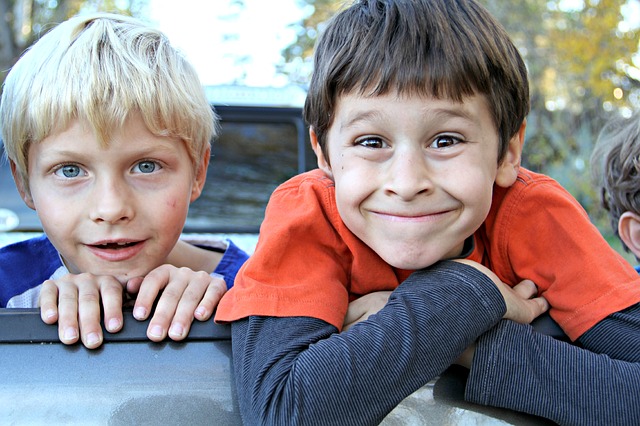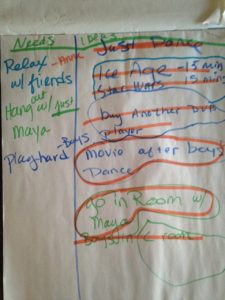
Children and conflict—it’s inevitable. As adults, we often assume it is our job to problem-solve these conflicts for them. However, what if that isn’t our job? What if the kids are capable? By solving their own problems they can become confident problem solvers that need less and less adult “help” to solve minor and, sometimes, not-so-minor problems. This approach works great with siblings, but I recently had the chance to try problem-solving out with a larger group of children and the result was just as cool.
There were five kids at my house when the yelling started; I went around the corner to see what was going on. The three boys were yelling at the two girls and the girls were giving it right back. It had been raining for two days and the kids were out of patience. The boys were threatening the girls; the girls were crying. This wasn’t going to solve itself. I jumped in with, “It sounds like you all might need some help.” Cries of injustice came at me all at once. They all wanted to use the TV and no one could agree on what to do. The boys wanted to play Just Dance, a video game that is played by dancing, and the girls wanted to watch a movie my daughter’s friend brought over. The boys said they would only watch TV if it was Star Wars. The girls did not agree. At all. Insults were flying—it was total mayhem.
Since I teach P.E.T. (Parent Effectiveness Training), my two kids are familiar with problem-solving, technically speaking—Method III Problem Solving. I asked my two, “What do you think about problem-solving this one?” They both energetically agreed.
Explain the Method
I went on to explain that we first try to figure out what each person really needs and from there we think of as many solutions as we can. I explained that when we run out of ideas, we are done brainstorming, and can then start to eliminate the ideas that don’t work for the whole group. When we started the first part of the process, identifying the needs of the boys and the girls, I explained that needs are why the person wants what they want or what it will do for them. For example, “needing to watch TV” is not a need, but being able to relax and calm down is a need. TV is one way to do that. Brainstorming ideas are “anything goes ideas” that cannot be judged or dismissed. Everything gets written down. Once everyone was clear on how to participate, we started solving.
Problem Solving in Action

When my 4-year-old daughter told me that her need was to watch TV with her friend, I was able Active Listen a bit, “You really want to watch with your friend” “Yes, I want to snuggle in the brown chair.” she replied. “Yes, I want to be with JUST her.” Aha! There was the need – she wanted time together with just her friend – companionship.
I went on to help the boys ages ranging from 3–7, figure out what they needed. They said, “To play Just Dance.” I confirmed “You really want to dance” And they told me right away that they needed to move because they had too much energy and they wanted to play hard. “OK,” I said, “There are your needs, now we can solve them, let’s think of ideas.”
Once we defined the needs and the real cause of the problem, we were easily able to solve it. The girls’ need was to spend time together alone to bond. The boys’ real need was to release energy. Knowing this information was key to the solutions they thought of and allowed them to solve the issue in about three minutes.
Decide on the Solution
Brainstorming ideas were all over the board, from taking turns watching their movies every 15 minutes to buying another DVD player. We wrote them all down. No judgment, remember?
Once we were done coming up with ideas, they crossed off the ones that anyone didn’t like. Fortunately, I get a say here, too, and was able to cross off running to the store for a new DVD player! The kids were able to agree that the girls would play together upstairs so they could still be alone together and the boys would play Just Dance to get their energy out while it was raining. The girls would watch their movie after the boys were done with their game. It was a win-win, or, rather, a “no-lose” solution. Everyone had a solution they were happy with and nobody felt they had lost in the negotiations. And I got to finish eating in peace!
When the arguing first started, I was tempted to offer my own solution (roadblock) and let them watch the movie the friend had brought over because it was a “special treat.” THIS WAS NOT THE NEED! The need was companionship and closeness. I would have prolonged the arguing because I was solving the wrong problem. This is why child-led problem solving is so great! The underlying needs were addressed, the agreed-upon plan was honored without any intervention from me, and there was no more arguing the rest of the day.

It is empowering for children to solve their own problems. Perhaps our job isn’t to solve problems for our children. Our job is to let them solve their own. When we assume they are capable, instead of incapable, we can offer the minimal amount of guidance necessary for them to be successful on their own. This perspective allows them the time and space to solve problems on their own and it builds confidence. When we let them reflect on their needs, it creates self-awareness—they can think more deeply and critically. As they learn how to do this effectively, they become empowered, competent, and empathetic problem solvers. The three minutes that it took to facilitate this prevented an afternoon of conflict, tattling, and tears because their solutions addressed the real problems. When children are put in charge of their own problems, they rely less on the adults and more on themselves. Win-win!
To learn more about P.E.T, check out the P.E.T. book or see if a class is in your city.
You might also like:
The Gift of Silence and How it Solved our Shoe Problems
The Day I Got Helicopter Parented

Thank you Kelly , every parent need this informations 🙏